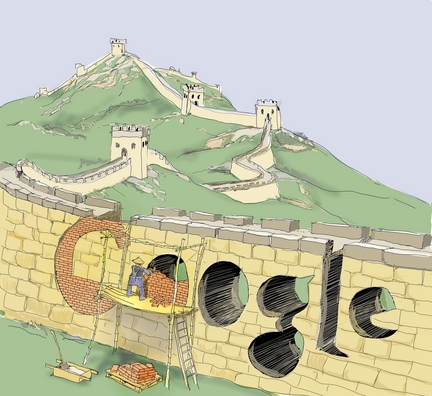
Google has worked its way to being one of the most audacious companies of all time, for its genius in customizing data for individual use. But in choosing to pick a fight with China over a business impediment presented as a lofty principle, that of defending Internet freedom, it could emerge eventually that Google thought itself too big to push. Even for a widely admired firm, that’s being foolish. Its declared wish to stop censorship in all its forms may be only half of the story, as there are deeper security implications in allegations that its computer systems in China had been attacked. But just now, the audacity it displayed in tossing a googly at Chinese government censors by directing mainland search users to its Hong Kong service has elevated a dispute that could still be negotiated, into a taunt.
The act is contrary to Google’s commercial instincts. Searches through Hong Kong of material Beijing wants off-limits are already compromised. This was expected. If Google foresaw this, it should be ready to defend its free speech integrity in court as the city, though Chinese territory, is outside central government purview.
This would take the messy episode to its originating premise: A multinational company operates in accordance with the laws and extra-statutory dictates of the host nation. It’s business. Since Google felt strongly it could not continue to censor search results (it began operations in China in 2006), it ought to hold true to its beliefs and withdraw completely. It has merely discontinued its search service, while retaining other businesses.
Google is facing tougher opposition from European governments over privacy and copyright issues and market dominance disputes. Its control of access to information in an insecure age makes governments there nervous. Germany and France ban neo-Nazi websites and most nations block pornography and child-abuse sites.
China’s political censorship impulse can be criticized as extreme, indicative of the unelected elite’s insecurity. It would be doubtful whether exposure to Falungong and Tibetan propaganda and revisionist versions of the 1989 Tiananmen incident would make revolutionaries of urban Chinese caught up in a get-rich scramble. Relaxation of censorship is for the people and their leaders to determine. Google’s bosses should be directed to this post in Tuesday’s chat avalanche on the China shutdown: “I love Google but I know the difference between right and wrong. Internet censorship is wrong to a degree. But it is more wrong of Google to profit in a country while defying its government. To demand that China not be China is a form of censorship.”